We all have anxiety. Anxiety serves an essential function in humans. Without anxiety, we would be extinct. Three elements of anxiety are:
- psychological – what we experience in our minds,
- physiological – how our bodies respond
- behavioral – what actions we take.
In this blog, I will review normal anxiety that we have all felt compared to pathological anxiety. Pathological anxiety is the unhealthy and life-impacting anxiety type. We will review responses in the body, some general mental health care, and finally 6 tools to deal with anxiety, which help with both normal anxieties, as well as pathological anxiety.
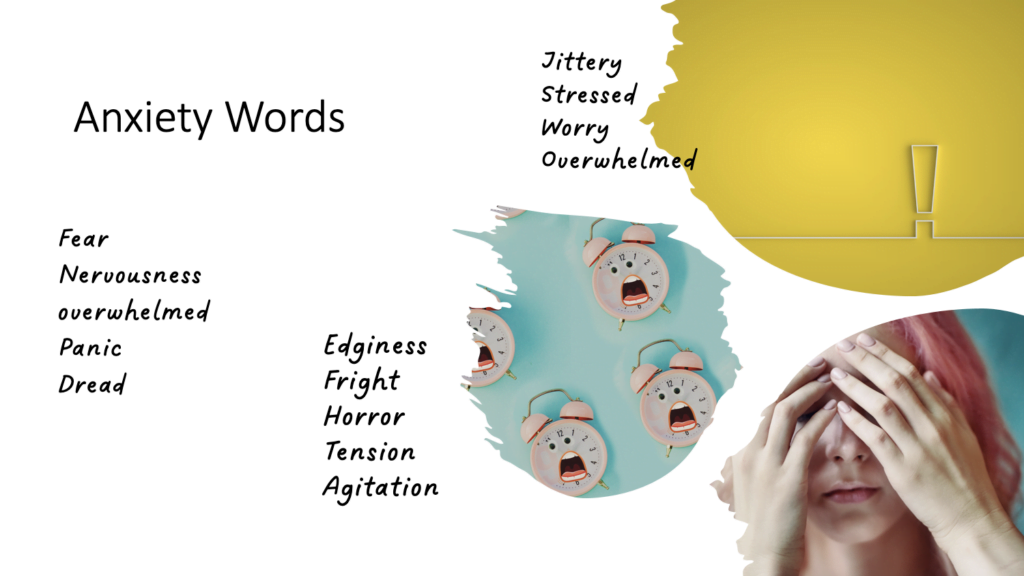
Why Do We Have Anxiety?
We humans need to be able to respond to our environment and to respond to challenges. Have you ever been walking down the street and come across a tiger? Well, likely not if you live in an urban/suburban area. But you may come across an angry customer or gotten into a car accident. Anxiety is part of our survival system. We feel anxious when our brains and bodies perceive threats. These perceived threats, that we may not be consciously aware of, start a cascade of processes in our mind and body. Our brain through our senses, emotions, and memory (both conscious and unconscious) will engage our stress response system. This is part of our survival mechanism. To survive, we need to quickly engage our bodies to react – without thought. During emergency situations we may not be aware of anxiety at all, and just act.

What sensations and experiences might be activated when this happens? Let’s talk about if you have had any of these sensations.
Normal Anxiety And Pathological Anxiety
Anxiety is part of our NORMAL experience as humans. Having anxiety in reaction to perceived threat, deadlines, a test, starting a new job – all normal responses. But there is anxiety that is unhealthy also known as pathological anxiety. What makes anxiety pathological or unhealthy? In general, pathological anxiety is different from normal anxiety in that:
- It persists over time or does not go away even when the stressful event or time has passed.
Example: You were in an auto accident 6 months ago, but you still feel your heart racing every time you need to drive to the store.
- The anxiety is uncontrollable and excessive to the point where it is affecting your quality of life. Excessive means it is out of proportion to the situation or is not age appropriate.
Example: The teenager who freaks out when mom or dad goes to work or out of town. It’s age appropriate to have separation anxiety between 6-12 months even up to 3 years old. If a teenager still has this, it would be pathological anxiety.
Diagnoses which are considered pathological types of anxiety:
- Separation anxiety disorders
- Social anxiety disorders
- Panic disorder
- Generalized anxiety disorder
- Agoraphobia
- Other specific phobias.
There are also other mental health disorders that involve anxiety as a symptom. Even though they are not classified as an anxiety disorder. These include:
- Obsessive-compulsive disorder
- Post-traumatic stress
- Acute stress disorder
- Depression
With these types of disorders, you can experience anxiety as one of the symptoms. But how and why they occur is a factor in how the American Psychiatric Association categorizes them differently, even though anxiety is a core symptom.
Anxiety affects both sexes equally. I highly recommend you listen to Adam Scroggin’s story of having a panic attack and how it can feel like you are dying.
Consequences Of Pathological Anxiety
If you think you have pathological anxiety. It is important to speak with a professional in the mental health field to explore further. Why? Because this prolonged pathological response to anxiety which is a disorder has real life impact on your health and functioning. Although it is not always the cause, anxiety disorders are associated with heart disease, high blood pressure, stroke, arthritis, asthma, gastrointestinal problems like peptic ulcers and irritable bowel disease, and chronic pain. Having a medical condition can also make you more likely to develop an anxiety disorder as well. So, make sure that you have a discussion with your health care provider.
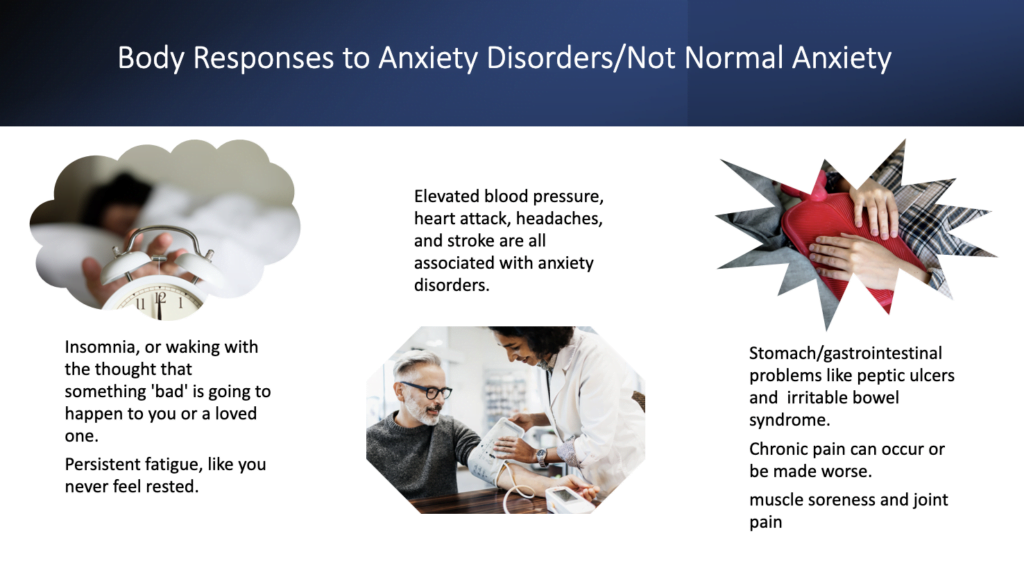
Some of our bodies responses to continued, prolonged, pathological anxiety.
What To Do If You Have Anxiety – The Basics
So, you have anxiety, what now? There are some great first steps to take for your general mental health, which can help you and your body be better prepared to handle anxiety, whether it is normal anxiety or a disorder.
Basic mental health self-care:
- Get regular physical activity. Activity adds up. It does not have to be all at once. 30 minutes total 5 times a week is the goal, but it does not have to start there. Start slow and progress to that goal.
- Eat healthy, regular meals and stay hydrated. A balanced diet with protein, carbohydrates, and fat. The emphasis should be on whole foods. Also drink plenty of water, which can improve your energy and focus throughout the day. Also, limit caffeinated beverages such as soft drinks or coffee.
- Make sleep a priority. Stick to a schedule, and make sure you’re getting enough sleep. Blue light from devices and screens makes it harder to fall asleep, so reduce blue light exposure for 30min to 1 hour from your phone or computer before bedtime.
- Try a relaxing activity. Explore relaxation or wellness programs or apps, which may incorporate meditation, muscle relaxation, or breathing exercises. Try journaling, taking a hot bath, or listening to music.
- Set goals and priorities. Decide what must get done now and what can wait. Practice saying “no” to new tasks if you start to feel like you are taking on too much. Give yourself praise for what you DO accomplish each day!
- Practice gratitude. Remind yourself daily of three things you are grateful for. Be specific.
- Focus on positivity. Identify and challenge your negative and unhelpful thoughts. Do not ignore the negative thoughts, challenge them, and only allow them so much time in your mental life.
- Stay connected. Reach out to your friends or family members who can and DO provide emotional support and practical help.
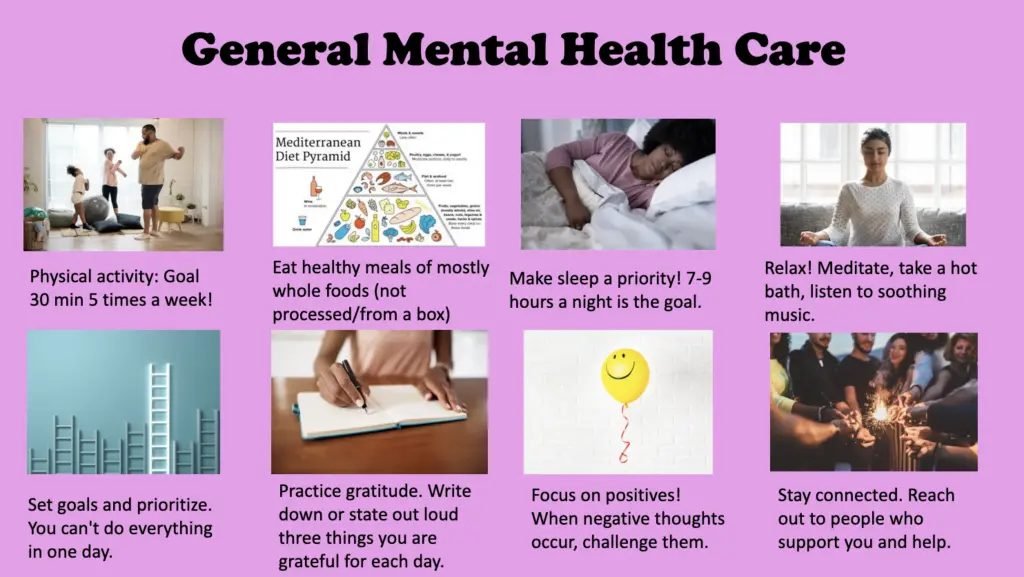
Remember, you do not need to do 100% of the healthy things above 100% of the time. Do them most of the time. For you it might be 70% of the time, or 95% of the time to achieve general mental health. Every individual is different.
The 6 Interventions Specific For Anxiety
Now that we have gotten down the basics of general mental health, which are foundational, we will look at 6 ways you can care for your anxiety.
- Learn about anxiety! You have already started but click on some of the links. Learning about what anxiety is, and its symptoms, can help you to better identify anxiety and know how it may be affecting YOU.
- Mindfulness. Mindfulness takes practice and training. It comes easy for some and can be challenging for others. Different from other meditation, it’s a focus on the present moment noticing sensations and emotions without judgement or trying to figure them out. Start with Youtube for something that is less than 5 min at first.
- Practice breathing exercises for anxiety. To de-activate the anxiety systems in the brain/body, we need to activate the relaxation system. A good start is to breathe in for 3 counts (count in your head 1… 2… 3…), then hold for 2 counts (count in your head 1… 2…), then exhale for 4 counts (count in your head 1… 2… 3… 4…). Do this three times and then allow your breath to go back to its natural rhythm. Repeat this exercise 3 more times.
- Physical activity… yes, again! This can be in addition to the physical activity mentioned above, or part of the routine that is our goal for general mental health. Yoga can be helpful for depression; high intensity workouts can be effective for anxiety.
- Find a support group. Not only does this provide social support but can help with problem solving and learning new ways of managing your anxiety.
- Grounding techniques. Grounding is a term used to bring your awareness back into your body and present moment. Different from mindfulness. These are used to help manage powerful emotions like anxiety but can also be used for other strong distressing emotions. Try one of the following.
- Pick a color at random. Now look around the room, making sure to move your head around to do so finding all the objects in the room that are that color. Name them aloud or in your head.
- Play the “alphabet game”. Pick a subject like animals, or sports teams, or cities, etc… For example, using animals, start naming animals using each letter of the alphabet in order. A… aardvark, B… baboon, C… camel…. etc… Make it challenging enough that you need to think about it a bit!
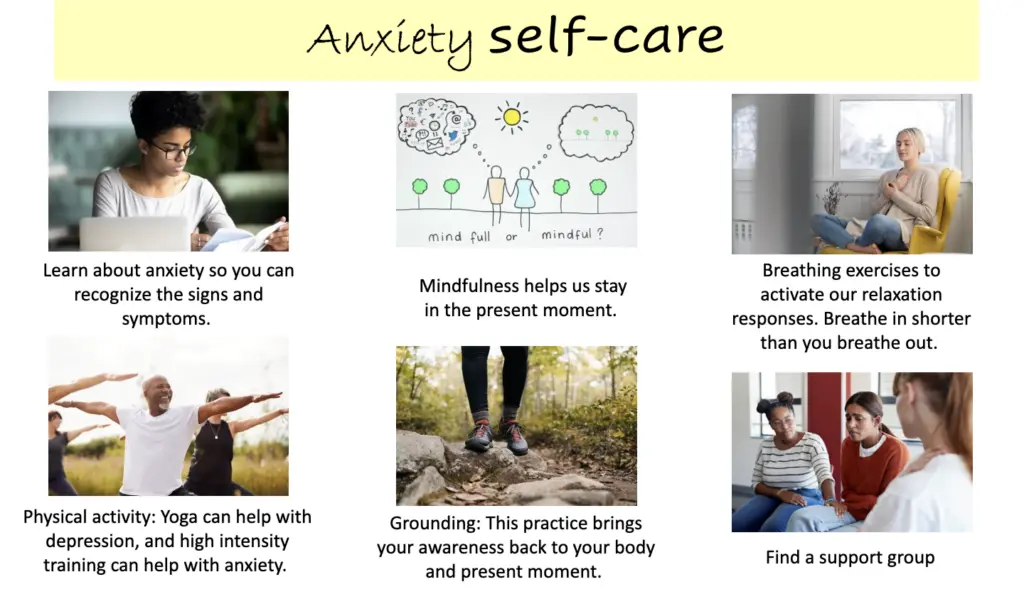
Anxiety is complex, but with some tools, learning and awareness, you can manage it! There are lots of other ways to manage, and even change our anxiety. If simple tools do not seem to help, continue to explore other options. There are hundreds!
Seek help from one of the many experts out there as well. Mental health professionals all have many tools to help. They can also help with exploring the origins and types of anxiety you might be experiencing and help to tailor your treatment to make it more effective. Lastly, it does take time. Especially if you have an anxiety disorder, it takes time, retraining, coaching, and sometimes several types of therapy to care for your anxiety. But you are worth it!
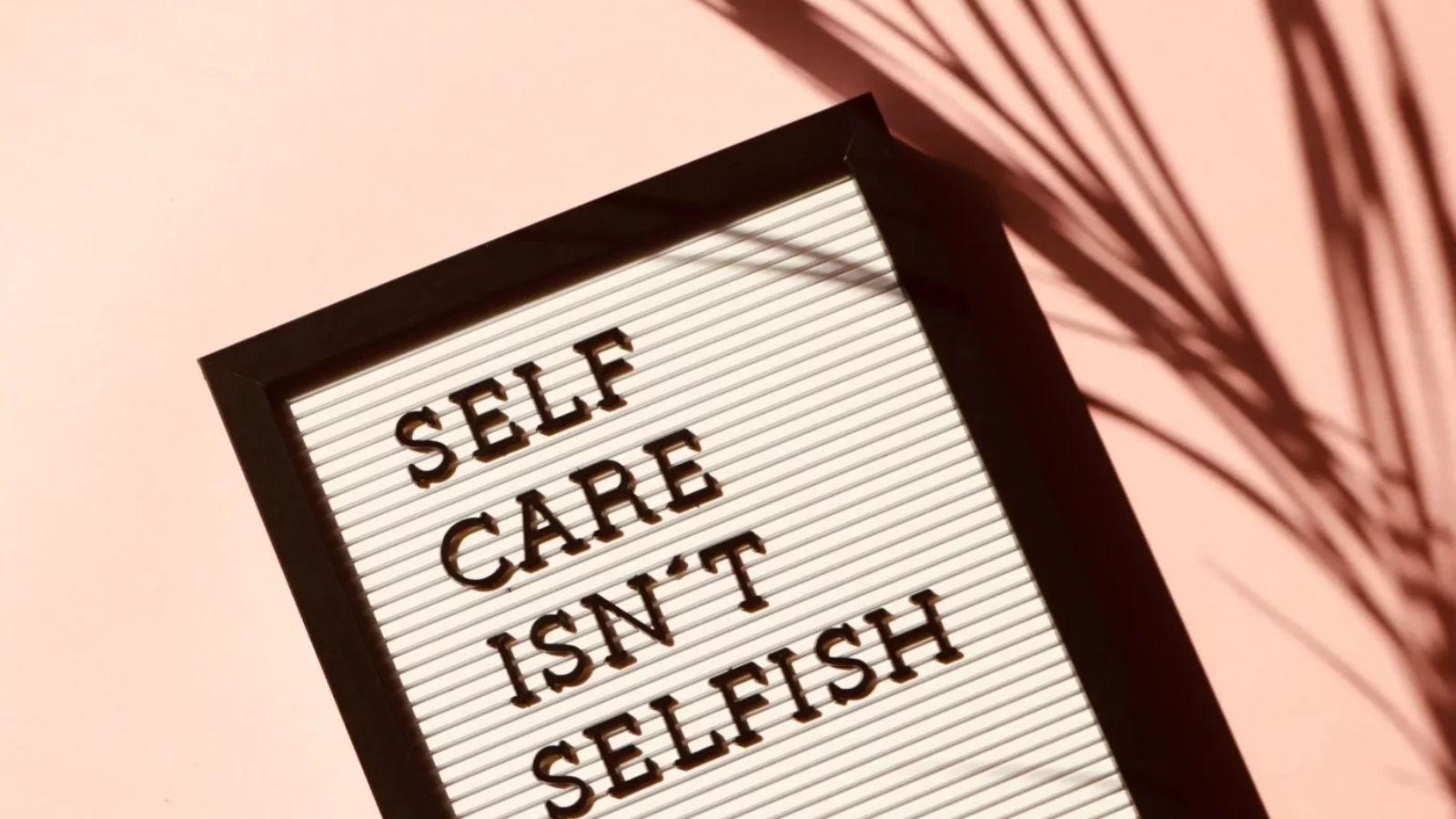
Add a Comment